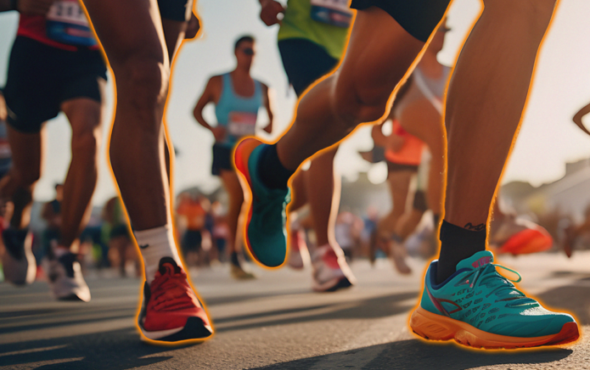
Football has always been the people’s game. Starting at a local level and going all the way up to the professional leagues, it’s a sport that brings people from all over the world together, no matter their backgrounds and identities. At its heart it’s a game that should be for everyone. Except when it’s not.
According to the Home Office, during the 2021 to 2022 football season in the UK, incidents of hate crime were reported in relation to 384 matches, which accounts for 13% of overall matches that season. Of those incidents, 106 were reported to be related to sexual orientation. This marked a rise in hate crimes at football matches from the 2018 to 2019 season, and that’s before we even begin to bring in online hate crime connected to football. Sure, football is the people’s game, but clearly some more work needs to be done before it’s everyone’s game.
It’s why initiatives like EE’s Hope United, now in its third iteration, are so important in making football a more inclusive space. And why GAY TIMES and EE have collaborated with talkSPORT for an hour-long roundtable discussion featuring former professional players and fans to combat any anti-LGBTQ+ sentiment in football.
Hosted by former England and Arsenal striker, Lianne Sanderson, the panel includes former England, Chelsea and West Ham midfielder, Joe Cole, who now works as a pundit, commentator and acts as an ambassador for Hope United, Fara Williams, England’s all-time most capped player and fellow Hope United ambassador. Joining them are Chris Paouros, the co-chair of Tottenham Hotspurs’ official LGBTQ+ fangroup the Proud Lilywhites, and Carl Fearn, the co-chair of the Gay Gooners, Arsenal’s LGBTQ+ fan group, which currently ranks as the largest fan group for LGBTQ+ fans in the UK.
Finally, Josh Cavallo discusses life as an openly gay player. Upon coming out in 2021, the Adelaide United midfielder became the first openly gay male top-flight professional footballer since Justin Fashanu in 1990. Cavallo has since used his platform to advocate for LGBTQ+ inclusion within the sport.
“Football has always been used to highlight issues and I think it’s great we’re starting conversations,” says Joe Cole. “Shows like this are the reason why I think we’re going in the right direction.”
As Fara Williams points out, things used to be very different. Even just a decade ago, conversations around homophobia and discrimination in football weren’t as wide spread and visible as they are now. This is apparent not only by the fact that players like Josh Cavallo and Blackpool player Jake Daniels can be open about who they are, but in the wider condemnation of homophobic chants at football matches by both managers and players, and initiatives like Stonewall’s Rainbow Laces campaign.
Still, there are genuine and valid concerns about anti-LGBTQ+ and homophobic behaviour before, during and after matches. Recalling an incident at a game between Brighton and Arsenal, Carl Fearn says that the Gay Gooners’ WhatsApp group chat was ablaze because of homophobic chants. While he wasn’t at the match in person, he says that while watching at home, he spent half the game trying to communicate with stewards and the stadium what was going on. “It was a miserable night,” he adds.
In fact, both Carl and Chris Paouros both emphasised that, in the future, they’d like to see both the Gay Gooners and the Proud Lilywhites become obsolete as things shift towards matches becoming a more inclusive space for LGBTQ+ people. Still, until that happens, Chris says that, despite rivalries on the pitch, LGBTQ+ groups from different clubs have worked together in order to tackle homophobia in the stands. She points to one particular chant that has now been classified as homophobic, which was a group effort between the Proud Lilywhites and Chelsea Pride.
“We gathered these statements and we presented them with some bit of support from the FA in terms of who to really get to in the CPS and the UK football policing unit,” she says. “And the FA have written a letter to all the clubs to say, ‘Look, this is a homophobic chant, it’s now against the law.’ That’s something we’ve done as fans that’s really important to make sure that we feel like we belong in football as much as everybody else does.”
What everyone agreed upon was that there is now a better framework in place at matches to report homophobia and discrimination, with things like the Kick It Out app allowing fans to report incidents. Groups like the Proud Lilywhites and the Gay Gooners are involved in helping deliver better inclusivity training for stewards. “Still, you always want to be safe,” Chris says of reporting anything that might occur at matches. “What I always say to our members is to take down the details, the row, the seat and so on and then report it. Sometimes they’ll come and deal with it at the time. Other times, depending on what’s going on, you’ve got cameras. So there are different ways.”
One of those includes EE Hope United’s GayVAR campaign, which encouraged fans to call out instances of online homophobic hate. EE Hope United monitored social media across three weeks in the Premier League game, with content posted online in response to specific moments that spawn homophobic abuse, from performances of specific players to goalkeeping and dives. Shared across EE’s social media channels was also a free online video content series with EE Hope United members such as Rio Ferdinand, Lucy Bronze and Andy Robertson educating users on how to challenge and report online homophobic abuse.
Such education is essential in helping football become more inclusive. During his time as a player, Joe admits that there was homophobic abuse at games, although as a player he was able to ignore it. “Now I understand the gravity of it,” he says.
Through his work with EE Hope United’s GayVAR campaign, Joe has campaigned to demonstrate how homophobic abuse should not be categorised as banter. He points to experiences from his own time as a player 20 years ago, where comments by other players and fans may have made an closeted players uncomfortable.
Still, he says, “[Players] that have come out as gay say that their teammates were some of the best and most welcoming people. As a football team, you come from all different religions and backgrounds, but you come together as a team because if one of you is hurting then you’re all hurting.”
Fara and Lianne, meanwhile, both pointed to the pre-conceived notion that anyone involved in the women’s game is a lesbian. “I feel like I’m always battling against that stereotype,” Lianne says. “It’s just not true.”
Nevertheless, it is the case that there is a higher percentage of out lesbian players in women’s football. “If you think about a game that was banned for 50 years and confined to the margins of society,” says Chris, “you’re going to have the women [who are] on the margins of society coming together and building [a] community around that.”
As the women’s game has grown and become more popular, however, demographics have changed. “I understand why [women’s football] has that stereotype, but it formed from back in the day when women only felt safe to play football together as a community. That’s difficult to change now.”
How, then, do you change these perceptions? Part of it comes down to education. But while it seems sensible to focus on the elite sphere of the game and hope that trickles down, it’s important to focus on the grassroots level of football too. “That’s where the funding and education should start,” Fara says, “because that’s going to create a better society in the years to come.
“I played 23 and a half years within the women’s game. I didn’t have one educational piece around racism,” she adds. “Yet one day in the season, I would wear a Kick It Out shirt. I knew what it was about but I wasn’t educated around it. [It’s the same] with the rainbow laces. You get your coach putting them in one day a year in the season with no education. So to make progress with these initiatives there has to come education. There has to be people on the ground actually going out and trying to educate people to make things better.”
Carl points to one experience he had while at an away game in Baku, in Azerbaijan, a country where LGBTQ+ people face higher rates of violence, harassment and discrimination. He recalls approaching a group of men asking them to stop using a homophobic chant. While most of the group apologised, admitting they didn’t realise the chant was homophobic, one man became aggressive with him.
Such an interaction demonstrates the need for allyship in football. A concern raised by both Joe and Fara was that they didn’t want to upset anyone or say the wrong thing. It proves just how important conversations like this roundtable, where people can learn and ask questions, are. “This is not about policing anyone’s language. It’s about having these conversations,” says Chris.
“It’s [also] people standing up when they hear something that’s not right,” adds Carl. “Because once one ally starts, then other allies may join in.”
Luckily, we are seeing more allyship across the board. In fact, according to a recent survey, a third of football fans felt that LGBTQ+ supporters weren’t made to feel welcome and accepted at matches, while a further 55% wanted to see their team increase its support for LGBTQ+ rights for players.
One way that teams are doing this is through better visibility. Both the Gay Gooners and the Proud Lilywhites have visible LGBTQ+ flags at their stadiums and during matches, with Chris explaining that the Proud Lilywhites also act as “critical friend” to the team. “We’ve done training with staff, training with stewards, we’ve worked with young people that are on coaching courses via the Tottenham Hotspur Foundation, as well as campaigning with the flag, which is really important to us. We’ve got this wonderful new stadium now, so it can turn into a big rainbow when we need it to.”
This all points towards a positive step forward for football when it comes to LGBTQ+ inclusivity. All the panellists agree that more education can only be a good thing. But there also needs to be hope, too. “We’re all football fans at the end of the day,” says Carl, “and so in ten years’ time I want us to be a happy family of football supporters.”
What’s more, it extends to players, too. “What we’re talking about here is making sure that people can feel comfortable, feel accepted and not be othered,” says Chris. “And we all know that if you can be your authentic self at work – and football is your work – you will perform your best.”
Through education, visibility and inclusivity for LGBTQ+ people, football really can become everyone’s game. Watch the full roundtable to learn more about the journey towards ending homophobia in football. For more information about EE Hope United and how you can help visit eehopeunited.co.uk.
